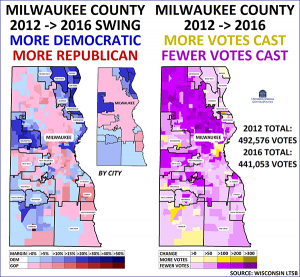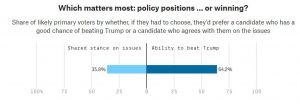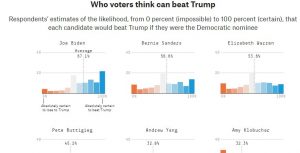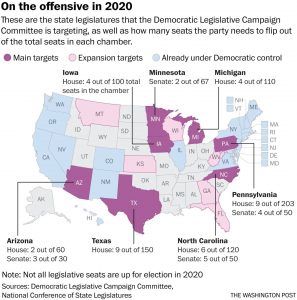Despite all of the yammering about impeachment, “in terms of whether the party can keep its House majority after 2020, impeachment may not be the most important vote the Democrats cast this month, or even this week,” Ronald Brownstein writes at The Atlantic. “Policy choices—namely, legislation to reduce prescription-drug pricing approved yesterday, and the revised free-trade deal that’s due for a vote next week—will likely have greater effects on the battle for control of Congress next fall, many Democratic strategists believe…Of all the measures House Democrats have passed this year, party strategists generally believe vulnerable incumbents are most likely to emphasize a handful in their reelection campaigns: In suburban and small-town seats alike, it’ll be the omnibus political-reform bill, and in suburban areas primarily, the expanded gun-control measures…But they expect their candidates, across almost all districts, to highlight the prescription-drug legislation more than any other…“The ability to tie health-care prescription-drug costs to your cost of living will be a cornerstone to winning in 2020, not only to the presidential, but to every race up and down the ticket,” said Dan Sena, the former executive director of the Democratic Congressional Campaign Committee, the caucus’s election arm.”
“It’s still an open question how strong Trump will be next year in the 31 Democratic-held House districts that he carried in 2016,” Brownstein continues. “Even back then, Trump reached 50 percent of the vote in only 13 of those districts. In the suburban areas on that list especially, he may have lost some ground, despite the booming economies around America’s cities. A national Quinnipiac University poll released Tuesday found that an unprecedented one-fifth of voters who approve of Trump’s handling of the economy nonetheless say they disapprove of his overall job performance, according to detailed results provided to me by the pollsters…Some on the left continue to believe the prescription-drug bill doesn’t go far enough, and others remain dissatisfied about reaching a trade agreement with Trump at all. But it’s clear those accomplishments are helping Democrats from marginal seats feel more comfortable going along with the caucus on impeachment. Indeed, reaching a deal with Trump on trade in particular, however paradoxical it seems, may have been the crucial final step toward building a Democratic majority next week for the vote that will brand him as only the third president ever impeached by the House.”
In “What if Democrats Have Already Won Back Enough White Working-Class Voters to Win in 2020?,” Joshua Holland argues at The Nation that “Since the 1980s, Democratic candidates have proven that they can win elections while losing whites without a college degree by a significant margin.” Holland notes that “Obama won 36 percent of their votes in 2012” and “in 2020, the candidate will likely need to win a smaller share of white people without a degree, because that group has long been declining as a share of both the electorate and the broader population. According to Gallup, their share of the population has declined by three percentage points since 2014. And a study released by the Center for American Progress in October projects that next year their share of the electorate will be 2.3 points lower than it was in 2016…According to a data set that combines survey and voter registration data with election results, Clinton lost non-college-educated whites by a 28-point margin in 2016, significantly worse than Obama’s 10-point deficit in 2008 or his 21-point gap in 2012.”
Holland adds “Meanwhile, Trump’s approval rates have cratered among all voters in all of the battleground states. Between Trump’s swearing in and the middle of last month, his net approval numbers (approval rate minus disapproval rate) fell by 23 points in Wisconsin, 21 points in New Hampshire, 21 points in Michigan, 18 points in Minnesota, and 19 points in Pennsylvania, according to Morning Consult’s polling. While those numbers aren’t broken down by race and educational attainment, those are the states where non-college-educated whites make up a majority of the electorate, according to David Wasserman’s data. (Trump’s net approval has also declined by 19 points in Ohio, 21 points in North Carolina, and 24 points in Florida.)” He concludes, “Given the paper-thin margins by which Trump won, Democrats probably don’t need to win the 36 percent of whites without a college degree that Obama got in 2012 to put together a winning coalition. With Trump firing up the Dems’ natural base, a shift of just a couple of points among this group could be decisive. And there’s every reason to believe that kind of movement is already baked in as we head into 2020.” Holland’s analysis seems reasonable enough for predicting that Dems will win the White House by a modest margin, barring any major screw-ups. But to win majority control of the U.S. Senate and a healthier share of state legislatures and governorships, Dems will likely need at least a little more support from white working-class voters than they received in 2016, which is certainly doable.
So, does the Labour party’s meltdown in the U.K. bode ill for Democrats in the U.S.? E. J. Dionne, Jr. writes, “Yes, there are lessons for U.S. politics in the landslide victory of British Prime Minister Boris Johnson’s Conservative Party and the historic collapse of Jeremy Corbyn’s Labour Party. But watch out for precooked conclusions based on ideological predispositions, and pay attention to the ways in which Britain’s situation is very different from our own.” Dionne adds that Corbyn’s “resounding defeat — Labour will have the fewest parliamentary seats since 1935 — does not mean that the candidacies of Sens. Elizabeth Warren (D-Mass.) or Bernie Sanders (I-Vt.) are automatically doomed. Corbyn is well to the left of both and had problems of his own (including his deeply flawed response to an outbreak of anti-Semitism in his party). But the Labour leader’s showing is a cautionary tale. It’s hard to argue now, as some on the left once did, that Corbynism represents the wave of the future…Whether Johnson lives up to his promises or not, it’s worth remembering that in seeking working-class votes, he moved his party to the left on economics by promising more spending on health services and infrastructure. There may be a lesson here for the hyper-ideological conservatives in the United States.”
At CNN Politics, Harry Enten, however, finds another useful lesson from the U.K. election: “You’re going to hear about a lot of supposed lessons that can be applied to the 2020 US elections from the 2019 United Kingdom elections…I think the clearest lesson is staring us right in the face: The polls are still pretty good as we head into the 2020 presidential election in the US…Take a look at the average of polls for the four parties that have earned at least 10 seats each in the House of Commons (the UK Parliament’s lower House). The average of the final UK polls had the Conservatives winning 43% of the vote, Labour 33%, the Liberal Democrats 12% and the Scottish Nationals 4%…The actual result was Conservatives taking 43.6%, Labour 32.2%, the Liberal Democrats 11.6% and the Scottish Nationals 3.9%. In other words, each of these parties got within 1 point of its final polled vote share…The US’s own polls have likewise been fairly accurate during the Trump era. The average House, Senate and governor’s polls were about a point more accurate in 2018 than they had been in similar elections over the prior 20 years. The same was generally true for House special election polling in the 2017-2018 cycle and the three governor elections of 2019 (Kentucky, Louisiana and Mississippi).”
FiveThirtyEight’s Dhrumil Mehta warns that “The Democratic Presidential Candidates Are Becoming Less Popular,” and explains that “even though Biden, Sanders, Warren and Buttigieg are nowhere near as unpopular as Trump, their net favorability ratings have trended downward recently. This isn’t totally surprising, though, as my colleague Geoffrey Skelley noted a few weeks ago: Many presidential candidates’ net favorability ratings have been negative or close to zero since at least 2008, a sign, perhaps, of the polarized times we live in.” However, ” despite one or two recent good polls for Trump, Trump remains really unpopular — far more than any of the leading Democratic presidential candidates.”
Now for the bad news, from Mehta’s “Other Polling Bites“: “Morning Consult collected surveys of nearly 375,000 adults and found that Fox News is the most-watched cable news outlet in the U.S. in more than two-thirds of the country’s congressional districts (respondents were asked whether they watched CNN, Fox News or MSNBC). On average, 33 percent of adults say they watch the network at least once a week, followed by 28 percent who say they watch CNN and 20 percent who watch MSNBC.”
At Slate, Dahlia Lithwick explains why “Two Small Articles of Impeachment Are Pathetic but Necessary: Democrats have taken one lesson from Mueller—don’t give Republicans too much to lie about.” Lithwick writes, “I think that the narrow nature of the impeachment charges speaks to the disinformation effort Democrats rightly expected to have to counter and their hope not to engage in a fight about multiple realities across multiple issues over a lengthy time period. In other words, my guess is that in the wake of the White House efforts to distort and confuse the outcome of the Mueller report by lying about it (efforts that were largely successful; it’s still referred to, falsely, as a “hoax” by the GOP), Adam Schiff, Jerry Nadler, and Nancy Pelosi made the reasonable decision to engage as little as possible with Republican lying. It is not simply that the impeachment managers have to sell a clean, coherent story, both to the public and in the Senate trial; it’s also that they need to avoid as many entanglements with fantasies and distractions as possible. Going narrow helps with that.” A good point about the distractions. But Dems and progressives can still run ads and give interviews sliming Trump and McConnell for their arrogant hypocrisy and shameful abuse of the Constitution and the rule of law.













